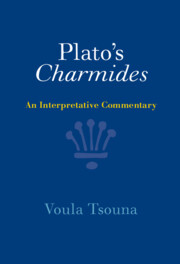Book contents
- Plato’s Charmides
- Plato’s Charmides
- Copyright page
- Contents
- Additional material
- Preface and Acknowledgements
- Chapter 1 Introduction
- Chapter 2 The Prologue (153a1–159a10)
- Chapter 3 Charmides’ First Definition of Sôphrosynê
- Chapter 4 Charmides’ Second Definition
- Chapter 5 Charmides Abandons the ‘Best Method’
- Chapter 6 Enter Critias
- Chapter 7 Critias’ Speech
- Chapter 8 Socrates and Critias Debate the Technê Analogy
- Chapter 9 Critias’ Final Definition
- Chapter 10 Can There Be an Epistême of Itself?
- Chapter 11 The Argument from Benefit (169c3–175a8)
- Chapter 12 The Epilogue (175a9–176d5)
- Charmides, or On Temperance: A Peirastic Dialogue
- Bibliography
- Index
- References
Bibliography
Published online by Cambridge University Press: 10 February 2022
- Plato’s Charmides
- Plato’s Charmides
- Copyright page
- Contents
- Additional material
- Preface and Acknowledgements
- Chapter 1 Introduction
- Chapter 2 The Prologue (153a1–159a10)
- Chapter 3 Charmides’ First Definition of Sôphrosynê
- Chapter 4 Charmides’ Second Definition
- Chapter 5 Charmides Abandons the ‘Best Method’
- Chapter 6 Enter Critias
- Chapter 7 Critias’ Speech
- Chapter 8 Socrates and Critias Debate the Technê Analogy
- Chapter 9 Critias’ Final Definition
- Chapter 10 Can There Be an Epistême of Itself?
- Chapter 11 The Argument from Benefit (169c3–175a8)
- Chapter 12 The Epilogue (175a9–176d5)
- Charmides, or On Temperance: A Peirastic Dialogue
- Bibliography
- Index
- References
Summary
- Type
- Chapter
- Information
- Plato's CharmidesAn Interpretative Commentary, pp. 326 - 338Publisher: Cambridge University PressPrint publication year: 2022
- Creative Commons
- This content is Open Access and distributed under the terms of the Creative Commons Attribution licence CC-BY-NC-ND 4.0 https://creativecommons.org/cclicenses/



